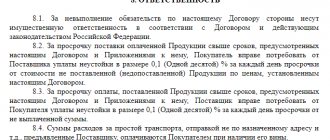What is a supply agreement
A supply agreement is a type of purchase and sale agreement. Its preparation and content are regulated by the norms of Articles 506–534 of the Civil Code of the Russian Federation. Article 506 of the Civil Code of the Russian Federation gives this document the following definition:
Under a supply agreement, the supplier-seller engaged in business activities undertakes to transfer to the buyer, within a specified period, the goods produced or purchased for use in business activities or for other purposes not related to personal, family, home and other similar use.
From this it is clearly clear that such an agreement can only be concluded by organizations and individual entrepreneurs. Ordinary citizens are not parties to such an agreement. In turn, state and municipal bodies can also be parties to such an agreement, although their activities are not entrepreneurial. For example, it is the supply agreement that is the result of a tender in government procurement.
Due to the fact that this document contains a purchase and sale transaction, the general rules provided for in Articles 454–491 of the Civil Code of the Russian Federation are applied to it, along with special rules specifically in relation to the supply of goods, works or services, these include liability for violation of the contract supplies.
Buyer's Responsibility
Often, violations of the supply contract by the buyer are expressed in the form of a delay in payment of funds. However, other situations are possible:
- lack of unloading area (leads to missed deadlines);
- late receipt of purchased goods, refusal to receive them;
- absence of a power of attorney from a company representative, which excludes the possibility of transferring valuables.
In the case of a delay in payment, the liability of the parties under the supply agreement is expressed in penalties for demurrage, payment for storage of goods, payment for the cost of its production, etc. These issues are resolved through arbitration courts, which impose penalties against the party that has not fulfilled the terms of the contract.
Item supplied and why it is so important
As mentioned above, the subject of the supply contract is exclusively goods, works or services intended for commercial use. However, the legislation does not further stipulate the nature of these goods, works and services. The role of the supplier in such an agreement is important. It is he who is responsible for correctly determining the nature of the subject of the contract. The fact is that such a sale is always recognized as a wholesale sale, even if only one unit of goods was supplied under the contract. Therefore, the seller does not have the right to apply such special taxation regimes as the patent system or the unified tax on imputed income (UTII). At the same time, neither the supplier nor other persons should control exactly how the buyer will use the goods purchased under the agreement: for personal purposes or in business activities.
Actions of the buyer in case of violation of delivery terms by the supplier
If the seller has not fulfilled the obligations stipulated by the agreement, the buyer has the right to file a claim in an arbitration or arbitration court and demand compensation for losses and payment of a penalty.
IMPORTANT! The court's imposition of penalties against a person who has violated contractual obligations does not relieve the person from the obligation to fulfill them.
How to make a claim
When drawing up a claim and statement of claim, the buyer indicates:
- full name of the judicial institution;
- names of the parties to the contract, details;
- list of requirements;
- description of the circumstances confirming the violation of the applicant’s rights or interests;
- the cost of the claim (if subject to assessment);
- information on compliance with the procedure for filing claims (if required by law or contract);
- list of attached documentation.
The application is signed by the head of the organization or its representative with appropriate authority. Sent to court in person or by mail.
A standard sample legal claim can be downloaded here.
Responsibility under the supply contract
Liability of the parties for breach of obligations may arise if they cause property damage to each other due to non-fulfillment or improper fulfillment of the terms of the contract. The Civil Code provides for the following types of liability:
- full or partial compensation for losses (Article 15, 393 of the Civil Code of the Russian Federation);
- payment of interest for the use of other people's funds (Article 395 of the Civil Code of the Russian Federation);
- payment to the injured party of a penalty for improper performance or failure to fulfill obligations under the contract (Article 330 of the Civil Code of the Russian Federation);
- commodity penalty or provision of non-monetary compensation that the debtor must make in case of violation of an obligation.
At the same time, the legislation considers penalties to be one of the ways to ensure the fulfillment of obligations. At its expense, the party affected by the actions of an unscrupulous partner can compensate for its property losses. In court, a penalty is also a measure of property liability for non-fulfillment or improper fulfillment of obligations (Determination of the Constitutional Court of the Russian Federation dated January 22, 2004 No. 13-O). In this regard, the penalty should be stated in the general section of the contract.
The terms of liability of the parties are considered agreed upon if they take into account the grounds for bringing liability, as well as its scope. In this case, the parties must discuss and take into account the rules for simultaneously applying several measures of liability for violation of the same contractual term. For example, in the event of a delay in delivery under an advance payment agreement, the supplier will have to not only pay a penalty, i.e., compensate for the buyer’s losses, but also pay interest on the use of his money.
It is important to remember that in any commercial transaction risks are borne by both parties, therefore the measures of responsibility should always be mutual and equal for each counterparty. Otherwise, the terms of the agreement may be challenged in court, found to be unfair, and it will not be possible to receive even a minimal amount of compensation. A well-drafted contract is reliable insurance against such situations.
Supplier liability
Typical violations by the supplier:
- violation of production and dispatch deadlines;
- failure to deliver;
- sale of low quality products;
- mismatch of assortment;
- provision of shortages, incomplete volume of goods, etc.
The customer's responsibility under the supply contract for the first two points is most often expressed in the accrual of penalties and fines. The mechanism for determining the size is provided for by the provisions of the concluded agreement. If this aspect is not specified, the amount is determined by the judicial authority during the proceedings.
In the last three situations, in addition to the penalty, the buyer has the right to demand compensation for damages for failure to fulfill the contract or its improper performance. He can file a claim to recover both actual damages and profits lost due to undelivered products.
Documenting
For the supplier to be liable, it is necessary to document the fact of incomplete delivery of goods. For this purpose, an act of non-delivery of goods is drawn up. If underdelivery is established directly upon acceptance of goods from the supplier or carrier, the parties must fill out a special act form - TORG-2. This document states:
- Data about the buyer: name, address, contact information, type of activity, administrative document on the basis of which the act was drawn up;
- Supplier information;
- Data on the cargo: place and date of acceptance, details of shipping documents, delivery method indicating the place of shipment, as well as data on the supply agreement indicating the invoice under which this consignment of cargo was delivered;
- Condition of transport and cargo: presence of seals on transport and cargo, type of packaging and its condition, number of packages, name of the product and its quantity;
- Information about discrepancies - filled in in the form of a table, which indicates data from shipping documents and actual acceptance indicators, the difference, positive or negative, is indicated in a separate column;
- Information about the product: name, article, unit of measurement, quantity, price and amount;
- Information about transportation and acceptance: conditions of transportation, condition of packaging, date of opening of packaging, inspection procedure;
- Information on methods for identifying shortages of goods: the procedure for determining the quantity of goods, data on the verification of measuring instruments used during acceptance, the nature of the identified discrepancies.
The act indicates the conclusion of the commission, which must contain an indication of the need to submit a claim indicating the amount of shortfall. The act is signed by all members of the commission.
The act of short delivery of goods, a sample of which is presented below, is applicable only if short delivery is detected directly upon acceptance of the cargo from the supplier. But in practice, there are often situations when the fact of incomplete delivery is revealed after some time, for example, after opening the shipping container, the absence of several units of goods is established. In such cases, the buyer must also draw up a deed. This document is drawn up in any form, but its content must take into account all the information on the identified discrepancies in the shipped goods. To draw up such an act, it is also advisable to invite a representative of the supplier, or to ensure documentary recording of the acceptance process, for example, by video recording.
The concept of short delivery and legislative regulation
Let us immediately note that the term “non-delivery of goods” is not disclosed by the Civil Code of the Russian Federation, but is contained in separate articles of this regulatory legal act. Law enforcement practice allows us to identify situations that can be regarded as underdelivery:
- Discrepancy in the quantity of goods specified in the contract and actually delivered to the buyer;
- A similar discrepancy between the actual quantity of goods and the data of shipping documents;
- Guilty actions of the supplier, limiting the buyer’s ability to sample the goods provided for by the terms of the contract.
Thus, short delivery of goods means any short delivery of goods, as a result of which the buyer received a smaller amount of inventory items than was provided for by the terms of the transaction.
Non-delivery of goods should be distinguished from short delivery. For example, if the goods were not delivered to the buyer within the agreed time frame, then this is considered a non-delivery, but in the case of partial delivery, the actions of the supplier will be considered a short delivery.
Fine
A fine is a one-time monetary payment for a violation. This measure of liability is established by the parties to the contract in case the “injured” party is interested in the very fact of violation or non-fulfillment of an obligation, and not the violation of the deadline as such. In order for the penalty clause to be considered agreed upon, companies need to determine its size - it can be expressed in a specific amount or, alternatively, as a percentage of the contract price.
In addition, the parties to the contract need to provide specific reasons for paying the fine, since otherwise the court will refuse to collect it. Thus, in one of the cases, the court refused to collect a sanction because it found that the party had not proven that a fine was provided for violation of any obligations specified in the contract (Resolution of the Arbitration Court of the Ural District dated July 24, 2021 No. F09-4017/17 in case No. A07-19429/2016). The grounds for collecting a fine may be, for example, the delivery of low-quality goods; failure to fulfill an obligation by a certain date; delivery of goods whose shelf life has expired at the time of delivery to the buyer.
Penya
The penalty is a sum of money payable by the debtor for each day, month or other period of delay in fulfilling the obligation. Thus, unlike a fine, a penalty is a continuing sanction. When including a provision for payment of penalties in the contract, it is necessary to determine its amount accrued for the corresponding period of delay. If the contract does not stipulate that a fine will be charged every day of delay or another period, such a condition may be regarded by the court as a one-time fine. This point of view was voiced by the FAS of the Central District in its Resolution dated May 4, 2007 in case No. A62-4475/2005. The grounds for charging a penalty may be different, in particular, violation of the delivery time of the goods; failure to meet payment deadlines; violation of the period to eliminate identified product defects, etc.
Government contracts
The adverse consequences are greater. Main sanctions:
- compensation for losses;
- interest;
- penalty or fine;
- forced payment for unselected goods;
- return of defective products.
The period for compensation of losses is established by law and is 30 days. The amount of fines is also regulated: when selling defective products - 20% of the price of such a batch (Clause 5, Article 16 79-FZ “On State Material Reserves”), when evading the conclusion of a government contract, the fine is equal to the cost of the goods (Clause 2, Art. 5 No. 60-FZ “On the supply of products for federal state needs”).








